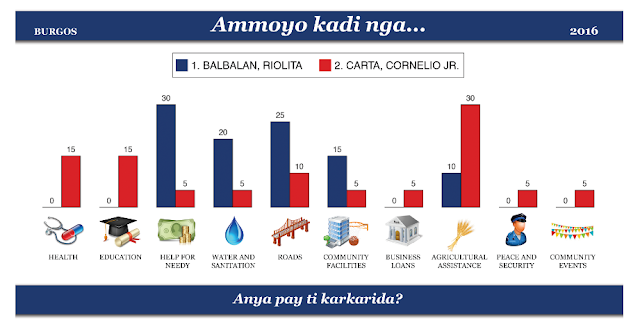The Search for an Educated Voter in the Philippines
It is easy to claim that gifts and favors decide which candidate will win in an election in the Philippines. This is actually very simplistic. Using policies and performance as guides in fact do not offer a clearer way for voters to decide. In so many ways, in a developing country where there are so many needs unmet, prioritization becomes an overwhelming task. A flyer intended to inform voters in a municipality in Ilocos back in 2016 illustrates this challenge:
One candidate, Cornelio Carta,, Jr., favors health, education, agricultural assistance, peace amd security, and community events while the other candidate, Riolita Balbalan, focuses more on helping the needy, water and sanitation, roads, and community facilities. Balbalan won the election in 2016. Recently, Carta run again for mayor but lost again while Balbalan won as vice mayor. Given the wide range of responsibilities shouldered by a local government, it is not easy to pick and choose. One can only guess that a voter will prefer a candidate whose priorities are similar to his or her own. The fact that Balbalan is victorious speaks more about what the citizens of this town can effortlessly see: helping the poor, water and sanitation, roads, and facilities. These maybe much more obvious than health, education, and agricultural assistance.
Nonetheless, how and why people vote is not a simple question to address. There are so many reasons, and some are more important than others, and which one ends up as the underlying motive depends on each voter. On the national level, a daughter of former president Ferdinand Marcos, Imee Marcos, has managed to secure a seat in the Philippines' senate. During the campaign period, it has become apparent that Imee Marcos was not truthful with regard to her educational attainments. The issue, however, has miraculously transformed from a question of faking one's resume to whether it is really necessary for an elected official to have a glaring pedigree. This only shows that voters have always formed a choice far before the election and will see any issue under the light of their initial preference. Candidates who win in elections in the Philippines are simply those who know and understand their constituents. They simply give or offer their voters what they want.
It is a lack of open-mindedness that plagues elections in the Philippines. Open-mindedness is our willingness to search actively for facts or evidences that may challenge our own preferred beliefs. It is embracing something that may actually challenge who we are. This is actually the type of voter that is very difficult to find in the Philippines and a scarcity of open-mindedness happens when there is a vacuum of credibility.
 |
| Above copied from Making Policies Matter |
One candidate, Cornelio Carta,, Jr., favors health, education, agricultural assistance, peace amd security, and community events while the other candidate, Riolita Balbalan, focuses more on helping the needy, water and sanitation, roads, and community facilities. Balbalan won the election in 2016. Recently, Carta run again for mayor but lost again while Balbalan won as vice mayor. Given the wide range of responsibilities shouldered by a local government, it is not easy to pick and choose. One can only guess that a voter will prefer a candidate whose priorities are similar to his or her own. The fact that Balbalan is victorious speaks more about what the citizens of this town can effortlessly see: helping the poor, water and sanitation, roads, and facilities. These maybe much more obvious than health, education, and agricultural assistance.
Nonetheless, how and why people vote is not a simple question to address. There are so many reasons, and some are more important than others, and which one ends up as the underlying motive depends on each voter. On the national level, a daughter of former president Ferdinand Marcos, Imee Marcos, has managed to secure a seat in the Philippines' senate. During the campaign period, it has become apparent that Imee Marcos was not truthful with regard to her educational attainments. The issue, however, has miraculously transformed from a question of faking one's resume to whether it is really necessary for an elected official to have a glaring pedigree. This only shows that voters have always formed a choice far before the election and will see any issue under the light of their initial preference. Candidates who win in elections in the Philippines are simply those who know and understand their constituents. They simply give or offer their voters what they want.
It is a lack of open-mindedness that plagues elections in the Philippines. Open-mindedness is our willingness to search actively for facts or evidences that may challenge our own preferred beliefs. It is embracing something that may actually challenge who we are. This is actually the type of voter that is very difficult to find in the Philippines and a scarcity of open-mindedness happens when there is a vacuum of credibility.
Comments
Post a Comment